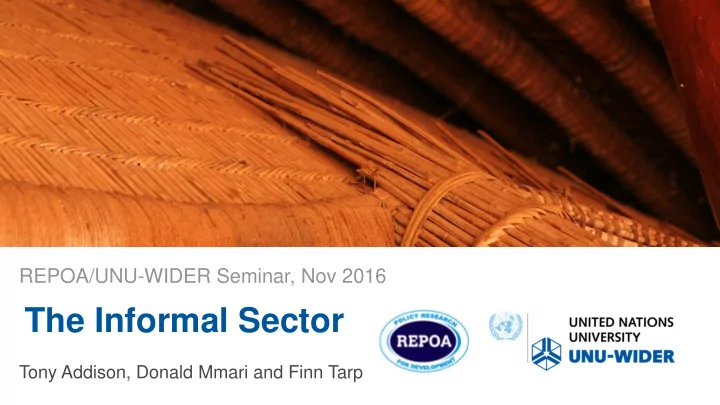

REPOA/UNU-WIDER Seminar, Nov 2016 The Informal Sector Tony Addison, Donald Mmari and Finn Tarp
Overview • Informal economy: diversified set of economic activities not regulated or protected by the state • Not only self-employment in small unregistered businesses but also wage-employment in unprotected jobs • Major employer of female-labour • Workings of informal sector more complex than stylized facts suggest
Informal Sector: growing not shrinking • Development economists traditionally viewed the informal sector as one that shrinks as economies grow (& more people move into formal employment) • But it is absorbing more & more new labour-force entrants & 40% of Africa’s GDP • Structural adjustment programmes in 1980s, but also rise in young workforce & dearth of formal sector opportunities • Also informalization driven by employers wanting to avoid regulation & taxation – leading to casualization of labour
Tanzania’s Informal Sector • 97% of all businesses & 86% of all urban properties are informal (MKURABITA, 2009) • 65% of all informal businesses are in wholesale & retail trade (ILO) • Of 25,000 manufacturing enterprises, 88% are micro-enterprises that engage 1-4 persons (60.3% engage 1-12 persons) (NBS, 2008) • Employs 2.4 million people, 22% of total employment • 40% of all households have informal activities • 48% of enterprises owned by men (ILO) • Informal sector is often (but not always) associated with low-income – much differentiation across the sector.
Policy Issues (1) • Main challenges: (i) raising productivity (ii) reduce risks & costs of doing business • Specifics: • Macro-economic & business environment • Legislative & regulatory framework • Developing linkages with larger enterprises (success in India). Tanzania: ‘Buyers Forum’ – large enterprises working with smaller enterprises in the supply chain • Improving infrastructure (e.g. ILO supported programmes for community-based organizations to apply for public funds for infrastructure improvement)
Policy Issues (2) • Access to education and training. Vocational & technical (VETA in Tanzania) • Access to capital & other financial services (in Tanzania, only 20% of people in informal employment have bank accounts) • Few lenders will extend credit to businesses that operate on informal premises (uncertainty & subject to removal) – insufficient plots available. BARA enterprise registration in Tanzania requires businesses have fixed premises before licence • ICT is a very weak area – digital economy & links to it, offer much potential (South Africa has successful programmes to improve small business ICT access) • Business development services (e.g. scheme in Zambia for micro enterprises to access business development)
Data • Given that the informal sector employs so many people & contributes significantly to GDP • There is a big need to get better data & information about the continuing evolution of the sector • Can’t understand employment opportunities, especially for young people, without tracking the informal sector
Conclusions • Informal sector employs increasing numbers of people • Urgent need to raise productivity in order to raise earnings • Increase linkages to formal economy, participation in supply chains, and take advantage of export markets • Not just products but also services: challenge is to move into higher value-added products & services • And eventually, perhaps, informal enterprises will formalize (including contributing to tax revenues)
Recommend
More recommend